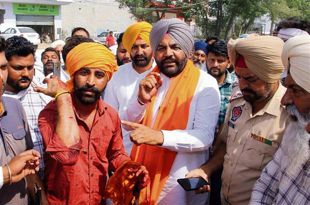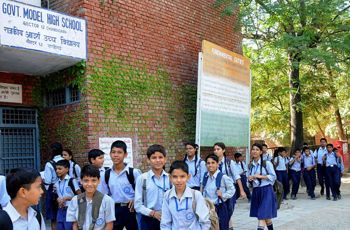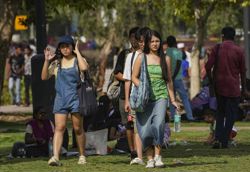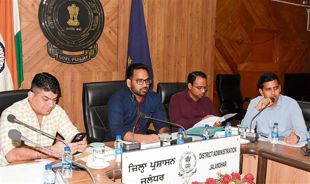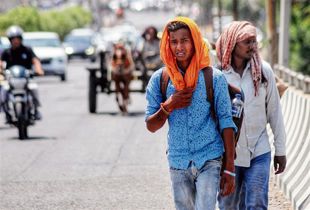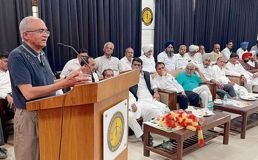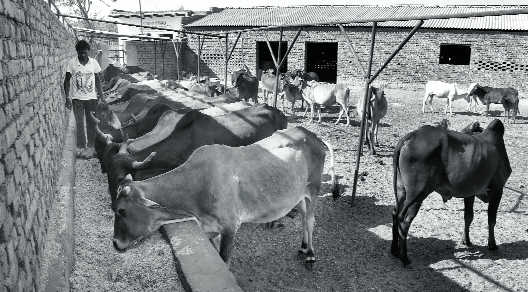
STRAY INTEREST? Many gaushalas in Mohd. Nagar in Mewat, Haryana, are owned by Muslims. Photos: Sayeed Ahmed
Sumedha Sharma in Gurgaon
The sense of the time is cow-centric, surprisingly, to make us believe in the animal-instinct-driven nationalism or thereabout. Our naiveté, so singularly born out of the bluntness of religiosity, could not have led the strays, and some of the animal protection protagonists, out of the herd mentality. Then came in the government fiat: cow protection has become a law. And no amount of chewing the intellectual cud at the baser thoughts about who the boss is in the penned part of secular democracy would do. Stay guarded, hoof it to the interiors of Mewat, where many among Meo Muslims — a section of them being ‘notorious’ for cattle smuggling and slaughter in the case files of the Cow Protection Force of Haryana Police — feel cheated, despite being ‘cow protectors’.
Listen in: “I am a Muslim and not a beef eater. I am a gau rakashak (cow protector). “ This is how Aabid Hussain, 23, introduces himself as he walks to Mohammadpur village that shelters Jeev Raksha Gaushala, the lone Muslim cow protection centre, in a Muslim area. One of the most ambitious inaugurations of chief minister Manohar Lal two years ago, this gaushala bore a festive look amid promise of ‘change’. It lies in a shambles today as 70-odd frail cows ruminate lazily in a crowded shed that stands over debris of a recently fallen wall.
The state assembly last year had passed a Bill clamping down on cow slaughter. The law provides for rigorous imprisonment of three years and, in some cases, up to 10 years. The state government has since been in an overdrive, proposing a gau rakshak taskforce to ensure enforcement of the law. “A taskforce, along the lines of home guards, is being considered. That way, the Haryana Gauvansh Sanrakshan and Gausamvardhan Act, 2015, could be strictly enforced,” says Bhani Ram Mangla, chairman, Haryana Gau Seva Ayog.
“The Mewat area is notorious for cattle smuggling and slaughter. The moment any of us mentions cow, we run the risk of being labeled as ‘gau bhakshak’ (beef eaters). Two years back when the government gave us this gaushala, we expected a change in attitude. But things have only worsened. This wall fell off in recent winds. We have written over 30 letters to the authorities, but nothing has happened. We tried getting donations, but nobody has come forward. It’s ironic that in most cases authorities avoid sending rescued cows to our guashala as they don’t trust us,” says Aabid.
The distrust runs so deep that even RSS-affiliated Muslim Rashtriya Manch (MRM) has been forced to put on hold its gaushala plans across India citing threat of cow vigilantes. Recently its activists ferrying two cows from Haryana to Delhi narrowly escaped being lynched by so-called ‘gaurakshaks.’ The outfit says it is unable to transport cows to the proposed designated shelters in other states, including Maharashtra, because of the threat. The MRM, the Muslim outreach body of the Sangh Parivar, had planned to start over 10 gaushalas at several sites such as Lucknow, Varanasi, Mewat, Punjab, Bangalore, Tamil Nadu and in the Pune-Sangli belt of Maharashtra this year. The MRM is seeking proscription of cow slaughter and has collected over 12 lakh signatures till August this year.
“Unfortunately, entire Mewat has been discredited… to reap political benefits. This is despite the fact that each village has youth who work for cattle welfare and assist the authorities in rescuing the cattle. But many gaushalas in these villages are in a bad shape for want of funds. The owners cannot accept donations from Meos openly for fear of being outcastes,” says Noor Din Noor, district president Aam Aadmi Party.
Faced with moral trials, Noor wrote to the government asking it to take away all cows from there. “The animal never cares who feeds or milks it, but it’s a very big political question as to who its saviour is.”
There was no resistance when the new law was passed. “Mewat welcomes it. Over 200 village panchayats accepted cow slaughter as a heinous crime. In these villages, if anybody is found involved in cattle smuggling, cow slaughter or beef trading, the panchayat hands him to the police and snaps ties with the family of the accused. Our efforts are not recognized for obvious reasons. We are not made part of any cow protection campaign or help units. We have been barred from calling ourselves cow saviours. We cannot even dare to transport cows to our shelters,” says Haatim Aas Mohammad of Phalandi village.
“Yes, we have many gaushalas being run by the Meos. Some are genuine, but there is no dearth of cases where we find gaushalas having a static number of cows for years despite these shelters getting additional numbers every month. The major problem that we face is sensitivity. If the policemen act, then they are accused of harassing the Meos, and if they don’t, they are accused of being hand-in-glove with criminals,” says Bharti Arora, head Cow Protection Force of the state police.
Bhani Ram Mangla, chairman of the recently appointed state Gau Seva Aayog, says religion has nothing to do with cow protection. “It may sound incredible, but it is a fact that the Muslims majority Mewat has 20-odd gaushalas which are doing a commendable job. For instance, the gaushala in Sangla village has 700 cows and is probably the first self-sustained gaushala of the state,” says Mangla. “We have put up plants for converting cow dung into incense sticks. I always emphasize that cow welfare centres are based on a fact that the animal has scientific importance in ecology and plays a vital role in producing medicine.”
The Gau Seva Aayog has several plans for Mewat. Mangla says Mewat will be the first district to have plants to convert cow dung into LPG or CNG. “We will purify cow urine for medicines and will be setting up a marketing unit for the same. We may be divided by religion or region, but when it comes to cattle welfare for boosting rural economy, we shall break all walls,” says Mangla. Given the ground situation, Mangala’s words sound sweet, but he will have to convince many like Aabid and Noor.





















